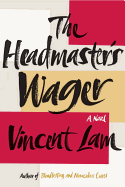
| Publisher: | Hogarth | |
| Genre: | General, Fiction, Historical, Literary | |
| ISBN: | 9780307986467 | |
| Pub Date: | August 2012 | |
| Price: | $25 |
| Starred | Fiction |
by Vincent Lam
Coping with shifting political tides can be hard to take even for the wisest man. For headmaster Percival Chen, a self-centered, self-made and womanizing aggrandizer with a gift for self-congratulatory ignorance, change can be downright earth-shattering.
In Vincent Lam's The Headmaster's Wager, the Chinese expatriate Chen must navigate the growing anti-foreign sentiment of war-torn 1960s Vietnam; a stranger in a stranger land, Chen still manages to make a fortune while staunchly adhering to his increasingly outdated pro-Chinese sentiments. His demons eventually come back to haunt him, however, as a misguided philosophical protest turns his son into a political prisoner and Chen turns to a prostitute for solace and comfort only to discover treachery and betrayal.
Though American readers may be familiar with the history of the communist takeover of China after the Second World War and the ultimate resolution of the Vietnam War, they may be less familiar with the role that Vietnam played as the "Gold Mountain" dream of poor Chinese journeymen who sought to plunder and reap its rich rewards. Lam's debut novel (after the short story collection Bloodletting and Miraculous Cures) is a fictionalized account of his own parents' and grandparents' family history--a well-researched effort resulting in a vivid, palpable and lyrical document evoking a forgotten segment of modern Vietnamese history. --Nancy Powell, freelance writer

| Publisher: | Atria | |
| Genre: | General, Fiction, Contemporary Women, Family Life | |
| ISBN: | 9781451609110 | |
| Pub Date: | August 2012 | |
| Price: | $16 |
| Fiction |
by Lisa Jewell
Lydia, a self-made millionaire at 29, is a loner, distrustful of human interaction after a depressing childhood with a miserable father. Dean is 21, a new father who is unemployed and smokes too much pot trying to escape tragedies he can't face. Robyn, 18, is a vivacious medical student with a novelist boyfriend and an apparently perfect life. On the surface, the three protagonists of Lisa Jewell's The Making of Us have little in common--except that they are all remarkably attractive. But then, separately, they make an astonishing discovery: they were all fathered by the same French sperm donor. This knowledge sends each of them on a voyage of self-discovery that will lead them to their father, to each other, to their mysterious fourth sibling--and ultimately to a better understanding of themselves.
Jewell brings these characters to life: exploring their complicated visions of themselves and the way learning about their siblings changes each of them. Though the story threatens to veer toward soap-opera melodrama, Jewell skillfully steers it back to a more believable scenario. The stories of Lydia, Dean and Robyn are each engrossing on their own; combined with the over-arching storyline of their father, they make for an irresistible read. Anyone who has ever pondered the nature of family or imagined finding a long-lost sibling will be captivated by The Making of Us. --Jessica Howard, blogger at Quirky Bookworm
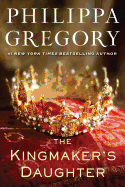
| Publisher: | Touchstone | |
| Genre: | General, Fiction, Historical | |
| ISBN: | 9781451626070 | |
| Pub Date: | August 2012 | |
| Price: | $26.99 |
| Fiction |
by Philippa Gregory
The Kingmaker's Daughter, the fourth novel in Philippa Gregory's Cousins' War series (which began in 2009 with The White Queen), delves deep into the life of Anne Neville, 16th Countess of Warwick, and Queen of England from 1483 to 1485. Gregory's detailed account of England during the Wars of the Roses, and the psychology and culture of 15th-century English courts, will prove a delight to her fans or to anyone enamored of English history. As with her previous novels, The Kingmaker's Daughter draws on a real figure of history, developing the emotional fabric of one woman's life to reveal in detail the world in which she lived. In the case of Anne Neville, it's a life lived as a pawn in the political plots of powerful men.
Daughter of the Earl of Warwick, known at the time as "The Kingmaker" for his ability to seat--and unseat--kings on the throne of England, Anne was always destined for a political marriage. But when her first husband dies in battle, she finds herself a teenaged widow, with her father killed, her mother claiming sanctuary and her sister married to the enemy. Anne is rescued by Richard, the younger son of the king of England, in a sweeping gesture of romance and passion, but soon realizes that she remains a pawn--albeit a loved and cherished one--in Richard's own political maneuverings. (History buffs are already nodding eagerly. For the uninitiated, here's a hint: Richard's schemes are a drama of Shakespearean proportions.) --Kerry McHugh, blogger at Entomology of a Bookworm

| Publisher: | Mulholland Books | |
| Genre: | Espionage, Fiction, Thrillers | |
| ISBN: | 9780316204200 | |
| Pub Date: | August 2012 | |
| Price: | $24.99 |
| Mystery & Thriller |
by Mischa Hiller
Mischa Hiller (Sabra Zoo) has created another intense spy thriller with Shake Off, his second novel. Michel Khoury, in London, works as a courier, spy and strategist for his enigmatic boss, Abu Leila. Abu Leila and the Palestinian cause are all Michel has left. Haunted by the death of his family in a refugee camp, Michel drugs himself to sleep every night to avoid his nightmares. When he's awake, however, he is constantly aware--analyzing every gesture and word of the people around him as he works to fulfill his missions without detection.
Michel's life is a lonely one, with essentially no contact beyond that with Abu Leila, until he becomes better acquainted with the girl renting the room next door in his boarding house. Her name is Helen, and Michel finds her irresistible. As developments in the Middle East (and glasnost in the Soviet Union) complicate his professional life, Helen and her lover simultaneously complicate his personal life, increasing Michel's tension to almost unbearable levels.
Shake Off moves at breathtaking speed, flashing between Michel's life in Lebanese refugee camps, years of training in the Soviet Union and East Germany and his current life in London. With all these locations, Hiller has brilliantly re-created the late '80s setting, making the immediacy of the Soviet breakup and the Israeli-Palestinian conflict all too real. --Jessica Howard, blogger at Quirky Bookworm
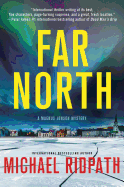
| Publisher: | Minotaur Books | |
| Genre: | General, Police Procedural, Fiction, Mystery & Detective, Thrillers | |
| ISBN: | 9780312675042 | |
| Pub Date: | August 2012 | |
| Price: | $25.99 |
| Mystery & Thriller |
by Michael Ridpath
Magnus Jonson is a detective from Boston who's moved back to his native Iceland, trying to fit in while working in the police department. The country is still recovering from the kreppa, or crisis, brought on by the recklessness of its bankers; in a country so small, those responsible are well known. They're also dying, one by one, and it's up to Magnus (who made his debut in Ridpath's 2011 novel, Where the Shadows Lie) to figure out why.
Michael Ridpath weaves a tale of two generations in Far North. The story of the modern-day murder investigation unfolds with a delightful sense of place and culture, showing readers the stark beauty and practicality of Icelandic culture and peoples. It seems as if everyone reads Icelandic epics or knows them from childhood; each character has a personal connection with Icelandic history and mythology. (Meanwhile, Inglief, Magnus's free-spirited girlfriend, messes with the investigation by talking to people she knows or is related to.) Nearly 80 years before all this, though, two neighboring boys in Iceland witnessed an illicit affair between their parents, and became bitter enemies over a lifetime of secrets not shared, secrets that reflect on Magnus's Icelandic heritage.
The setting alone will thrill readers interested in Iceland and its many charms, while the story of the financial crisis is timely and plausible, filtered through the Icelandic culture as Far North builds up to its satisfying climax. --Rob LeFebvre, freelance writer and editor
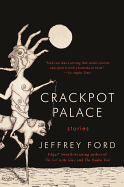
| Publisher: | Morrow | |
| Genre: | General, Fiction | |
| ISBN: | 9780062122599 | |
| Pub Date: | August 2012 | |
| Price: | $14.99 |
| Starred | Science Fiction & Fantasy |
by Jeffrey Ford
Speculative fiction has produced several great practitioners of the art of the short story whose critical acclaim matches that given to more traditionally "literary" writers. With his fourth collection of short stories, Crackpot Palace, Jeffrey Ford is positioned to join such luminaries as Ray Bradbury and Harlan Ellison in that inner circle.
Ford's stories are stuffed with so many ideas, weird scenes and startling denouements that it is hard to summarize them. In "Down Atsion Road," Ford mixes urban legend, a ghost story and the New Jersey Pine Barrens to chilling effect. While his inventiveness is unmatched, he is also a master of psychological realism. There is a gritty day-to-day aspect to some of his tales that adds a degree of verisimilitude to events most genre writers wouldn't have a clue how to sustain. In "Every Richie There Is," a mentally challenged neighbor's slow disintegration from cancer and madness is chronicled with devastating skill. Finally, Ford's sense of the place where the weird intersects with the beautiful is unsurpassed; "Dr. Lash Remembers" is a steampunk gem where dream, sickness and hallucination are layered into disorienting new patterns.
With Crackpot Palace, one has a chance to read a collection by a true master of the short story. For lovers of the weird and fantastic and lovers of great writing, this is a treasure trove of disturbing visions, new worlds and fully realized craft. --Donald Powell, freelance writer
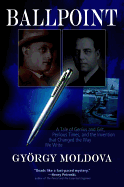
| Publisher: | New Europe Books | |
| Genre: | Holocaust, History, Technology & Engineering, Europe, Austria & Hungary, Science, Technical & Manufacturing Industries & Trades | |
| ISBN: | 9780982578117 | |
| Pub Date: | August 2012 | |
| Price: | $14.95 |
| History |
by Gyoergy Moldova, trans. by David Robert Evans
Although his work is little known in English, György Moldova has been Hungary's bestselling author for more than 40 years. In Ballpoint: A Tale of Genius and Grit, Perilous Times, and the Invention that Changed the Way We Write, Moldova tells the story of two other notable Hungarians largely unknown in the west: Lázló Biró and Ander Goy, the inventors of the ballpoint pen.
The story of the pen's development is interesting in itself, beginning with Biró life as a Jewish journalist in interwar Budapest, frustrated by a leaking fountain pen. Biró's technical difficulties and triumphs are told in a clear, non-technical manner. His search for financial partners is a lesson in understanding legal documents before you sign them.
But what really makes the book is Moldova's use of Biro and Goy's story as a lens through which to view the troubled history of Hungary in the mid-20th century. Biró escaped from fascism by fleeing first to Paris and then to Buenos Aires. Once in Buenos Aires, he traded increasingly large percentages of the rights to his as-yet-undeveloped pen for help in getting his family safely out of Hitler's Europe. His erstwhile partner and fellow inventor, Goy, remained in Hungary. He prospered under fascist rule, but lost everything when the new communist government nationalized his company. By the end, as a result of financial deceptions and legal chicanery, both partners had no rights to the pen. The pen was a success; its inventors weren't. --Pamela Toler, blogging at History in the Margins
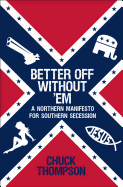
| Publisher: | Simon & Schuster | |
| Genre: | Political Science, Travel, United States, Anthropology, Conservatism & Liberalism, Social Science, Cultural, Essays, Political Ideologies, South - General | |
| ISBN: | 9781451616651 | |
| Pub Date: | August 2012 | |
| Price: | $25 |
| Political Science |
by Chuck Thompson
With a title like Better Off Without 'Em, Chuck Thompson's "manifesto" looks like little more than a polemic screed at first glance. Two things, however, make it a surprisingly worthwhile read. First, Thompson presents plenty of evidence that Northerners are being taken for a ride, at least financially, by their neighbors below the Mason-Dixon Line. No southern state but Florida, for example, contributes more money in federal tax revenue than it takes in federal assistance and entitlement programs--even, as Thompson gleefully points out, while conservative politicians in those states rail against big government.
Second, he constantly reminds us of his own hilarious arrogance as he stumbles through nearly two years of southern travels. "Three southern-fried rock pilgrims in the honky-tonk badonkiest bar in South Carolina can't summon a single nugget from the pride of Spartanburg?" Thompson argues when faced with a Skynyrd-playing bar band who claims not to know anything by Marshall Tucker. "Am I the only real redneck in this joint?" he asks--even when, in his Old Navy T-shirt, dirty black Levi's and Nikes, he "might as well be wearing a top hat and carrying a jewel-encrusted walking stick" compared to the rest of the bar's patrons.
Thompson may revel in his regional jackassery, but the facts he musters in support of his political argument are worth note. Then again, it's hard to take him too seriously, when he reveals his deepest animus against the South: the SEC's unfair overrepresentation in college bowl games. --Cherie Ann Parker, freelance journalist and book critic
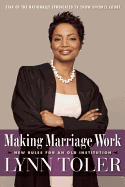
| Publisher: | Agate Bolden | |
| Genre: | Family & Relationships, Marriage | |
| ISBN: | 9781932841657 | |
| Pub Date: | August 2012 | |
| Price: | $15.95 |
| Psychology & Self-Help |
by Lynn Toler
In Making Marriage Work, Divorce Court judge Lynn Toler shares her experience from the bench--and from her 22-year marriage--in a series of rules designed to help couples avoid ever reaching her television courtroom.
In the introduction, Toler explores why the divorce rate in the U.S. continues to rise: are couples unwilling to put forth the effort to create a strong marriage or is the secularization of marriage to blame? Is love too fickle an emotion to base a serious commitment like marriage upon? Or has the institution simply become obsolete? "Once an institution of obligation, [marriage] is now one of choice," she writes. Rather than looking to old solutions, then, we need a new approach--hence her rules.
Toler believes that marriage is still a viable institution since humans are social creatures and can thrive in a committed relationship--if they are prepared to be practical both before and during marriage. Her sense of humor is a welcome companion to her practicality; for example, her take on Divorce Court: "Yes, I know the show is a bit extreme, voyeuristic, and, well, often a little silly, but if you listen past the anger, I sincerely believe that the people on the show have something to teach us all." Happily, Toler is neither extreme nor silly in her "how to" book on marriage, and the result is a hands-on, practical guide for couples at every stage of marriage. --Kristen Galles from Book Club Classics
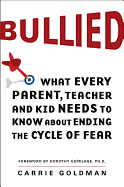
| Publisher: | HarperOne | |
| Genre: | General, Parenting, Family & Relationships | |
| ISBN: | 9780062105073 | |
| Pub Date: | August 2012 | |
| Price: | $25.99 |
| Psychology & Self-Help |
by Carrie Goldman
The name-calling, taunting and threatening that nearly one in five teens--and close to half of all middle-school students--report having experienced has extended beyond school grounds to the Internet, encroaching upon the safety of a child's home. When she learned that her daughter was being picked on in first grade for using a Star Wars water bottle, Carrie Goldman wrote a blog post that quickly went viral as hundreds of readers--including geeky girls, effeminate boys, children with disabilities and members of the GLBT community--responded with their own stories of being bullied or being a bully.
Bullied incorporates Goldman's experience with those of her blog readers, adding extensive research and analysis by experts, to question the role gender-specific toys and clothes play in identifying those who might be "different." She believes that it is only through confronting and changing the stereotypes that define girls as "sexy" and boys as "hyper" or "tough" that bullying will end. This relearning can begin at a very early age, but it should also extend into changing the attitudes of parents and other adults. Goldman provides readers with surveys to identify the type of mistreatment their children suffer and with techniques to implement at home and at school to counteract the effects of a bullying attack. She also includes techniques to help the bully stop his/her aggressive behavior. Bullied is a constructive and informative tool toward creating a more empathetic world for all. --Lee E. Cart, freelance writer and book reviewer
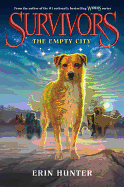
| Publisher: | HarperCollins | |
| Genre: | Animals, Fantasy & Magic, Dogs, Juvenile Fiction, Action & Adventure | |
| ISBN: | 9780062102560 | |
| Pub Date: | August 2012 | |
| Price: | $16.99 |
| Starred | Children's & Young Adult |
by Erin Hunter
The launch of Erin Hunter's new Survivors series (after Warriors and Seekers) stars an unforgettable cast of canines in a world nearly devoid of humans (or "longpaws," as the dogs refer to them).
Lucky, a golden-furred sheltie-retriever mix, awakens from a dream of a story that his Mother-Dog once told him, about the "Big Growl" the Earth-Dog causes in an attempt to capture Lightning's life force. Moments later, the Big Growl hits the "Trap House," and Lucky and fellow captive Sweet are the sole survivors. Sweet longs to be back in a pack, and Lucky wants to go it alone, so they part ways. In a mall, Lucky has a chance meeting with his litter sister, Bella, who begs Lucky to join her and a makeshift pack of Leashed Dogs, dogs that belonged to longpaws.
Erin Hunter sets up a tantalizing tension between Lucky's wild instincts and his loyalty to his litter sister and her band of domesticated friends. Through his eyes, we see the devastation of the earthquake: houses abandoned, streets shattered, toxic waste leaking into the water. Will Lucky ever feel confident enough in the Leashed Dogs' abilities to leave them? Or will his sense of responsibility to them outweigh his desire for autonomy?
Hunter lays the groundwork for a world in which these thoroughly likable characters must let go of their bonds to their longpaws and move toward a Pack strategy of cooperation, and share physical strengths, experiences and resources in order to exist. --Jennifer M. Brown, children's editor, Shelf Awareness

| Publisher: | Bloomsbury | |
| Genre: | General, Fairy Tales & Folklore, Fantasy & Magic, Juvenile Fiction | |
| ISBN: | 9781599908731 | |
| Pub Date: | August 2012 | |
| Price: | $16.99 |
| Children's & Young Adult |
by Shannon Hale
Shannon Hale delves more deeply into her beloved characters in this sequel to the Newbery Honor book Princess Academy, which takes Miri to the big city and plants her right in the middle of a political morass.
Danland is being bankrupted by the king's demands for increasingly extravagant tributes, there's a revolution brewing, and the revolution wants Mount Eskel on their side. The Princess Academy graduates have been invited to travel to Asland, the capital city, and stay for a year. And while not all of them will go, Miri and Peder jump at the chance. But when they arrive, Miri is immediately drawn into a dangerous situation. Britta barely has time with the other Academy girls because of her royal duties and impending wedding to Prince Steffan, and Katar, the Mount Eskel delegate, asks Miri to find out more about the rebels plotting against the king. As she tries to figure out whom she can trust, Miri also struggles to figure out who she is--a mountain girl, a city scholar or something else entirely.
While Princess Academy was primarily an adventurous coming-of-age story, Palace of Stone is far more political. Miri has to learn how court etiquette works in practice, not just in theory, and navigate her way through shifting allegiances, widespread unrest, philosophical quandaries and emotional uncertainties. There is certainly derring-do (some truly epic derring-do, in fact), but there's also a deep thoughtfulness and an intellectual edge to Palace of Stone that add layers to the characters we already love. --Jenn Northington, events manager at WORD bookstore